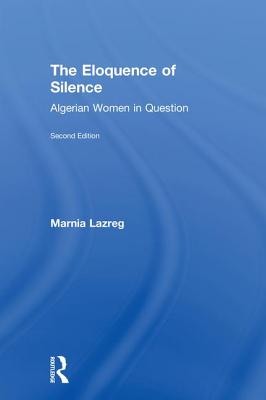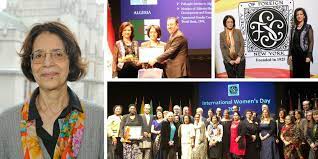

 Routledge
Routledge
The Eloquence of Silence: Algerian Women in Question


Key Metrics
- Marnia Lazreg
- Routledge
- Hardcover
- 9781138293274
- -
- -
- Social Science > Women's Studies
- English
 Secure Transaction
Secure TransactionBook Description
The Eloquence of Silence, first published in 1994, is considered a seminal text in the scholarship of women and North Africa. Marnia Lazreg makes a critical departure from more traditional studies of Algerian women, which usually examine female roles in relation to Islam - and instead takes an interdisciplinary approach, arguing that Algerian women's roles are shaped by a variety of structural and symbolic factors. These include colonial domination, demographic change, nationalism, family formation, the turn to culturalism, and the progressive shift to a capitalist economy.
Grounded in archival research supplemented by interviews, and adopting a historico-critical method, the book identifies and examines the significance of an enduring feature of women's journey: their instrumental use as tropes in struggles between groups of men opposed to one another during political crises. It demonstrates that despite being central to contentious political issues, women's needs and aspirations were obscured just as their voices have traditionally been silenced.
This new edition is thoroughly updated throughout to connect the original material to major political disruptions in the twenty-first century, such as the 9/11 attacks on New York and events around the Arab Spring. The book foregrounds women's determination to forge ahead, as well as their activism, which led to progress in fighting rape and other forms of violence made banal in the wake of the civil war (1992-2002). It also calls for a decolonization of concepts and theoretical systems used in accounting for women's lived reality, and a questioning of facile postfeminist discourses in their manifold expressions.
Author Bio
Marnia Lazreg is professor of sociology at Hunter College. She is a graduate of the University of Algiers from which she received a Baccalaureate in Mathematics, and Philosophy as well as a licence-ès-Lettres, with three distinctions. She also received an MA and a Ph.D. in sociology from New York University. She was awarded fellowships at the Pembroke Center for Teaching and Research on Women (Brown University); the Bunting Institute (Harvard); The Institute for Advanced Study (Princeton), the Rockefeller Bellagio Center, Italy, as well as a Fulbright grant to Algeria. Her research focuses on the structures that inform cultural change as well as shape conceptions of self, identity and gender relations in societies undergoing the transition from colonial and/or economic dependence to political sovereignty. A parallel interest is to identify and theorize the frequent gap between theoretical concepts applied to non-Western societies and the reality they intend to explain, which may hamper cross cultural understanding.
Her early study addressed the socio-cultural shocks experienced by Algeria in the aftermath of its decolonization, and culminated in the publication of her first book, The Emergence of Classes in Algeria: A Study of Colonialism and Socio-Political Change (Westview, 1976). Her encounter with the feminist movement in the United States led to her writing of what is now a classic, widely used in the English-speaking world, The Eloquence of Silence: Algerian Women in Question (Routledge, 1996).
Intrigued by the antinomy between humanism, human rights and the widespread use of torture in the past decade, she undertook a case study of the systematic use of torture by the French military during the Algerian war (1954-62). Torture and the Twilight of Empire: From Algiers to Baghdad (Princeton 2008) has received wide acclaim.
Her interest in the reveiling movement that spread throughout the Muslim world helped to crystallize the relationship between the neo-colonial character of contemporary geopolitics, war and gender. Questioning the Veil: Open Letters to Muslim women (Princeton, 2010) historicizes and demystifies reveiling by exploring the main (largely mundane) reasons invoked for its occurrence.
In addition to books, she is also the author of numerous articles and chapters in anthologies. In continuity with her interest in culture, he has recently completed a manuscript on Michel Foucault’s struggles with how to theorize cultural difference. Her central question is to determine how it is that a most inspiring social philosopher defined non-Western rationality as a “limit-experience” for Western reason? How did such a view affect his sojourn in Tunis, his reporting on Iran and his interaction with people in Japan?
Apart from teaching, she has served as consultant on gender and development for the United Nations Development Program as well as UNESCO. She has also worked as the coordinator for Europe and Central Asia at the World Bank wile also doing cross support work on the Middle East and North Africa.
She has given keynote lectures and spoken at conferences in the United States, Europe, the Middle East and Africa. She has appeared on television and given numerous radio interviews.
Her work has been translated into Arabic, French, German, Italian, Spanish, and Turkish.
Source: Hunter College
Videos
No Videos
Community reviews
Write a ReviewNo Community reviews